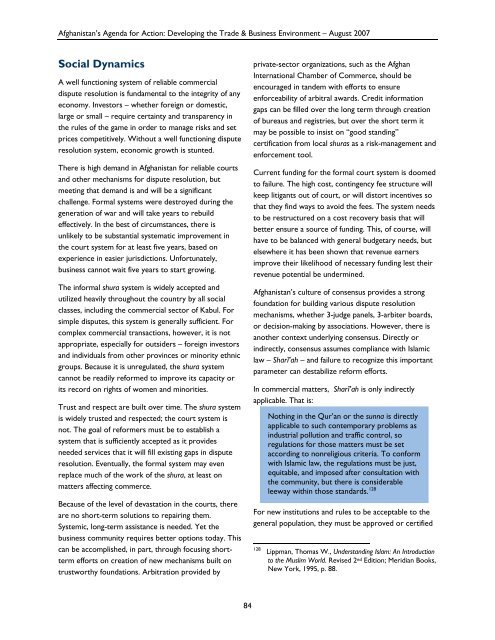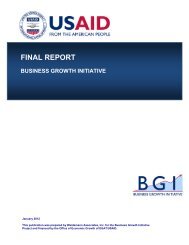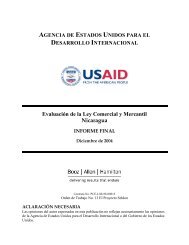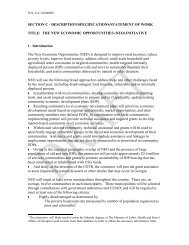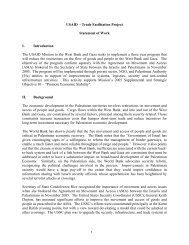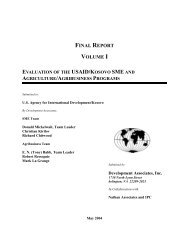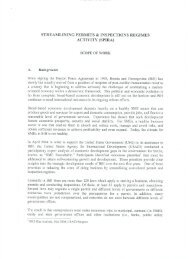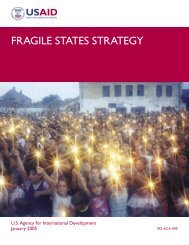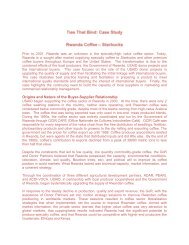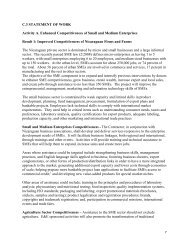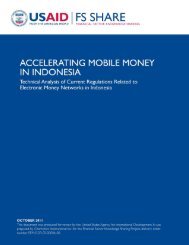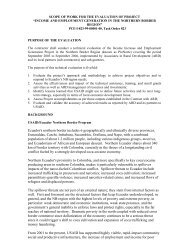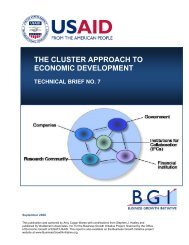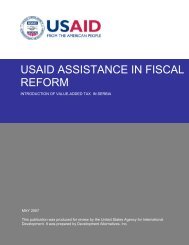Afghanistan's Agenda for Action - Economic Growth - usaid
Afghanistan's Agenda for Action - Economic Growth - usaid
Afghanistan's Agenda for Action - Economic Growth - usaid
You also want an ePaper? Increase the reach of your titles
YUMPU automatically turns print PDFs into web optimized ePapers that Google loves.
Afghanistan’s <strong>Agenda</strong> <strong>for</strong> <strong>Action</strong>: Developing the Trade & Business Environment – August 2007Social DynamicsA well functioning system of reliable commercialdispute resolution is fundamental to the integrity of anyeconomy. Investors – whether <strong>for</strong>eign or domestic,large or small – require certainty and transparency inthe rules of the game in order to manage risks and setprices competitively. Without a well functioning disputeresolution system, economic growth is stunted.There is high demand in Afghanistan <strong>for</strong> reliable courtsand other mechanisms <strong>for</strong> dispute resolution, butmeeting that demand is and will be a significantchallenge. Formal systems were destroyed during thegeneration of war and will take years to rebuildeffectively. In the best of circumstances, there isunlikely to be substantial systematic improvement inthe court system <strong>for</strong> at least five years, based onexperience in easier jurisdictions. Un<strong>for</strong>tunately,business cannot wait five years to start growing.The in<strong>for</strong>mal shura system is widely accepted andutilized heavily throughout the country by all socialclasses, including the commercial sector of Kabul. Forsimple disputes, this system is generally sufficient. Forcomplex commercial transactions, however, it is notappropriate, especially <strong>for</strong> outsiders – <strong>for</strong>eign investorsand individuals from other provinces or minority ethnicgroups. Because it is unregulated, the shura systemcannot be readily re<strong>for</strong>med to improve its capacity orits record on rights of women and minorities.Trust and respect are built over time. The shura systemis widely trusted and respected; the court system isnot. The goal of re<strong>for</strong>mers must be to establish asystem that is sufficiently accepted as it providesneeded services that it will fill existing gaps in disputeresolution. Eventually, the <strong>for</strong>mal system may evenreplace much of the work of the shura, at least onmatters affecting commerce.Because of the level of devastation in the courts, thereare no short-term solutions to repairing them.Systemic, long-term assistance is needed. Yet thebusiness community requires better options today. Thiscan be accomplished, in part, through focusing shorttermef<strong>for</strong>ts on creation of new mechanisms built ontrustworthy foundations. Arbitration provided byprivate-sector organizations, such as the AfghanInternational Chamber of Commerce, should beencouraged in tandem with ef<strong>for</strong>ts to ensureen<strong>for</strong>ceability of arbitral awards. Credit in<strong>for</strong>mationgaps can be filled over the long term through creationof bureaus and registries, but over the short term itmay be possible to insist on “good standing”certification from local shuras as a risk-management anden<strong>for</strong>cement tool.Current funding <strong>for</strong> the <strong>for</strong>mal court system is doomedto failure. The high cost, contingency fee structure willkeep litigants out of court, or will distort incentives sothat they find ways to avoid the fees. The system needsto be restructured on a cost recovery basis that willbetter ensure a source of funding. This, of course, willhave to be balanced with general budgetary needs, butelsewhere it has been shown that revenue earnersimprove their likelihood of necessary funding lest theirrevenue potential be undermined.Afghanistan’s culture of consensus provides a strongfoundation <strong>for</strong> building various dispute resolutionmechanisms, whether 3-judge panels, 3-arbiter boards,or decision-making by associations. However, there isanother context underlying consensus. Directly orindirectly, consensus assumes compliance with Islamiclaw – Sharī’ah – and failure to recognize this importantparameter can destabilize re<strong>for</strong>m ef<strong>for</strong>ts.In commercial matters, Sharī’ah is only indirectlyapplicable. That is:Nothing in the Qur’an or the sunna is directlyapplicable to such contemporary problems asindustrial pollution and traffic control, soregulations <strong>for</strong> those matters must be setaccording to nonreligious criteria. To con<strong>for</strong>mwith Islamic law, the regulations must be just,equitable, and imposed after consultation withthe community, but there is considerableleeway within those standards. 128For new institutions and rules to be acceptable to thegeneral population, they must be approved or certified128Lippman, Thomas W., Understanding Islam: An Introductionto the Muslim World. Revised 2 nd Edition; Meridian Books,New York, 1995, p. 88.84


